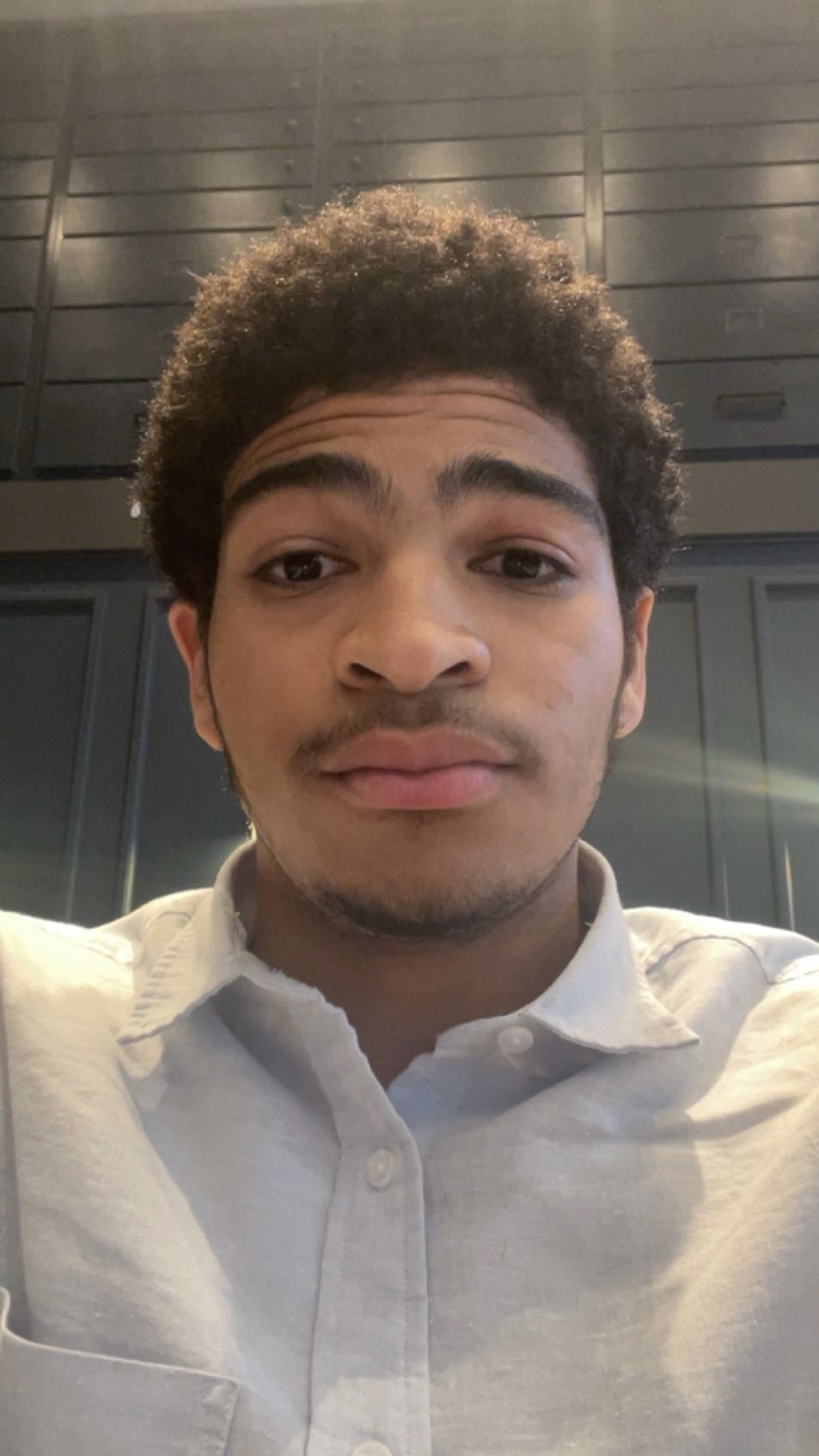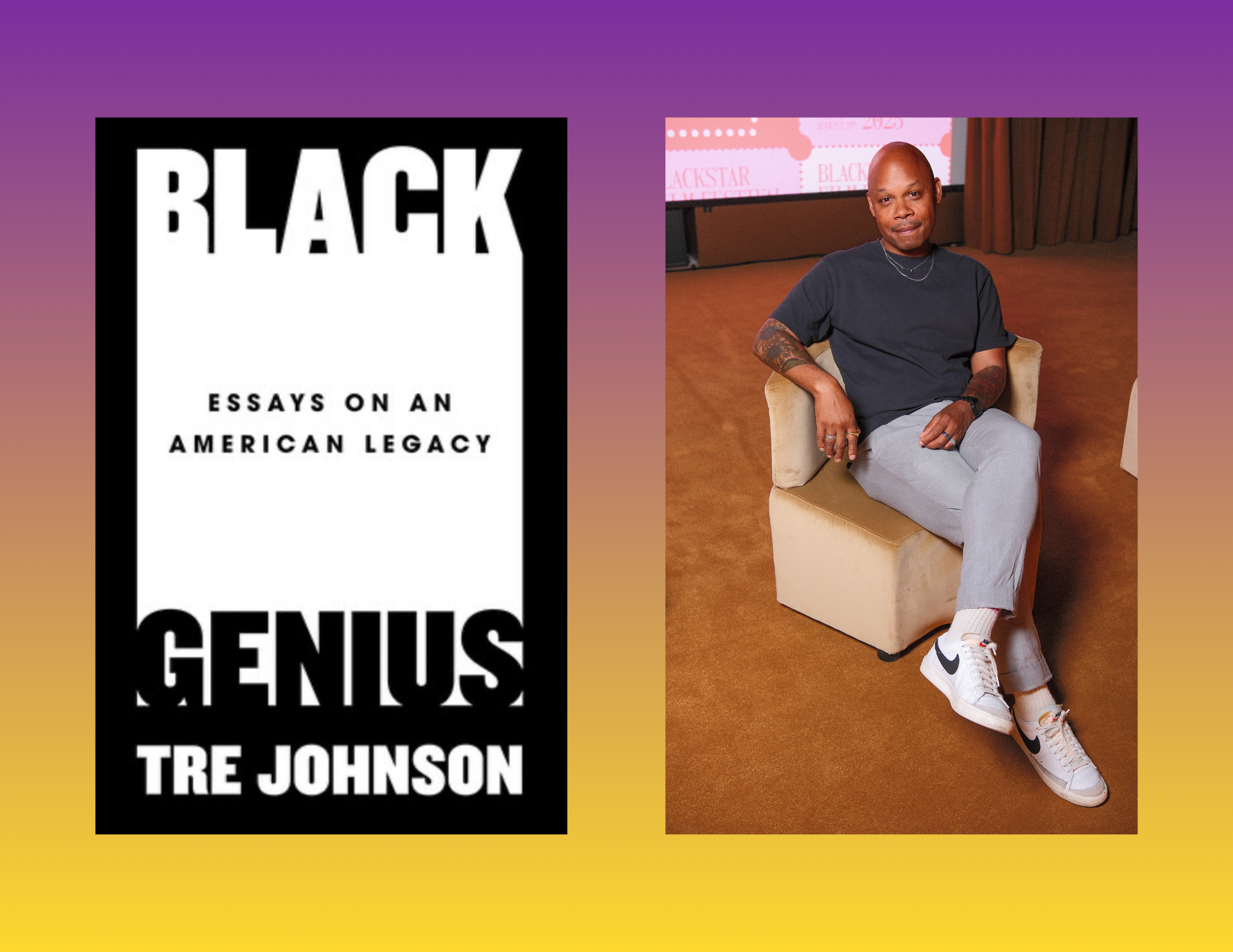Tre Johnson was born in Trenton, NJ and now finds himself in Philadelphia, where he writes with a focus on race, culture and politics. His work has appeared in The Washington Post, Rolling Stone, Vox, The New York Times, Slate, Vanity Fair, The Grio, and other outlets. He has appeared to provide media commentary on CNN Tonight with Don Lemon; CBS Morning Show; PBS NewsHour, NPR’s Morning Edition, and other programs. In addition to writing, Tre is a career educator, beginning working both inside and outside in the classroom as a teacher and eventually as a leader in the sector.
Brendan Smith: Can you give a brief overview of what Black Genius is about and what concepts you introduce throughout the book.
Tre Johnson: So, Black Genius, the way I talked about it, is a nonfiction debut book of essays looking at the cultural context in which Black American and Black genius operates in American society. And for me, I wanted to do a couple of things. I wanted to, one, challenge the notion of the word “genius” because I feel like everyone has a fixed definition of what genius might mean. And two, I wanted to explore what it looks like to celebrate and love black ingenuity in life, at all levels and all identities. I just wanted to look at both very concrete things, but also abstract ways in which we are innovative and truly ingenious about how we make it to and through an American–life context. That’s why the book is kind of split up the way it is. There are very concrete things like digital age, there’s comic books, and graphic novels. There’s the education world. But there’s also slightly more abstract things like surveillance, performance, and celebration.
BS: Were there any approaches you took while writing to make the book culturally specific to black readers, but also to make it more accessible to a wider audience?
TJ: I think specificity always helps. That’s why I took on things like flash mobs and the ATV tried bike culture. Or looking at very explicitly black things like the Odunde Festival, because I wanted to ground stories and perspectives in ways that I know were going to be closest to black experience, while also hopefully informing people who are outside of it how to appreciate and observe these things. Particularly, if you’re maybe somebody who’s not gonna be inclined to go into some of these cultural spaces. Some of it’s just about, how do we appreciate the humanity in the black experience at all levels, despite or especially when it might be uncomfortable for people. And so, I wanted to be thinking about how you encourage people to see us more fully instead of holding up all these detours about why we’re not worth it.
BS: Can you talk a little bit about your writing? I know for me, I have to write at a very specific time and space. But what’s your process like?
TJ: I would typically go Monday through Friday, 10 AM start, go no later than 7. And probably like a lot of writers, I always tell people that doesn’t mean I’m writing every one of those hours. It means that I need to have that chunk of time available to do something around writing. Sometimes it was working on stuff. Sometimes a successful day was having 9 hours set aside to fix two or three pages of the book. But I think the biggest part of my process had to include being compassionate to myself. I’ve never written a book before. It’s long. It’s hard. It’s confusing. It’s not linear, and so the best thing I can do is give myself rampant time and space in a canvas to approach this book the way that I mentally and emotionally need to. Sometimes it also meant that it would go away. So, I wrote chunks of the book here in Philly, but also worked on chunks of the book in Montreal, DC, New Orleans, Napa Valley, Hawaii. And so that also helped me at times, just removing myself from all of life’s distractions.
BS: You talked a bit about how the writing process for you wasn’t linear exactly and how concepts came at different times. I know the book sections are structured in a very intentional way, but did you change it throughout the process, or was it something that you needed to remain the same for what you were trying to accomplish?
TJ: The full initial manuscript that I turned in was 450 pages. The thing I always say is, I’m a first–time book author. Even though I’ve been writing freelance essays for a while. I was a first time Black book writer, writing a book called Black Genius and I was like I cannot **** this up. So, I just put so much in and give them everything that I’m thinking, and then we’re gonna chop it down to what makes sense. I started with what I knew. And then I gave myself the freedom to change my mind and follow where this book takes me. But it means that I’m going to change my mind about a lot of stuff. The earlier drafts didn’t have as much of the abstract chapters that this book has now. Everything before was like “I got to prove to these motherfuckers that black folks are amazing and I know what I’m talking about”, so it moved to such a different place. But that’s because the editor and my agent told me, “You are doing this book because we all believe in your talent and your voice. You need to write the book that you want to write, not the book that you believe other people want you to write or feel like other people are going to accept you writing.” And that was a game changer for me.
BS: Speaking of your editor and your agent, I read that you were first published because someone read one of your rants on social media. I was wondering how your former writing experiences with things like magazines, but also with your content on social media helped you throughout this new process.
TJ: I say this to all my friends. If you want to be a writer, you find a way to write every day. For me, it’s about the constant act of writing, critically thinking, engaging, just trying to say different things in different ways. That is what my agent and my editor unlocked in me. They were like, “Look, you have written beautifully and thoughtfully in so many other ways and spaces. You don’t have to become something else in order to do this book. You can access all those things that you have, the ways you have talked about things before.”. And I didn’t believe that for the longest, and I think when I relaxed and listened to them, when I trusted them, and when they convinced me to put myself inside of a book like this, that’s where everything started changing more.
BS: Are there any other ways you think you’ve grown from the experience of writing Black Genius?
TJ: I think the biggest thing I’m realizing is the book has taught me to have a greater capacity to love myself and to be kind to myself. I’ve been in so many situations where I’ve had my confidence challenged and taken away from me. It’s been so life changing to do something that feels like it is mine, coming from me, that I get to share with the world. And I’m not doing so by feeding it through other people’s systems and expectations. What’s weird about this year is that this is both the year that my book came out, obviously, but it’s also the year that my dad died. My dad died back in February suddenly. And I think both events now feel linked together for me. What they both have taught me is that it’s a real gift to get a chance to live a life with purpose. I think I was somebody struggling to identify a certain type of purpose for myself. And for whatever it means writing, my dad’s death, and this book coming out have crystallized for me or it’s giving me the confidence to say what I’ve always wanted to be able to say out loud, which is that I’m a writer. I want to write. I think I’m pretty decent at it and I still want to get loads better, but I need to embrace my gifts and I need to be able to do something that I love because so many people spend their entire lives doing all sorts of bullshit that they don’t want to do because they feel like there’s no other choice.
BS: And lastly, I know that you’re going on tour and have a whole bunch of stuff happening for the current book. But I would hate myself if I didn’t ask, what’s next?
TJ: I just applied to a residency and one of things they ask you is what do you anticipate working on. And I listed like 4 projects. I don’t know for sure what my next book length project will be. I know what I like genre–wise. I am interested in exploring American vigilantism in society. I also have novel ideas that I want to do about maleness and toxic Internet culture, and there’s a screenplay I’ve started working on, too. I don’t know what’s going to come out first or what’s gonna take the lead. But I’m running parallel tracks, working on a couple different things right now. I just love writing.
You can learn more about Tre Johnson and Black Genius on his website here.

Brendan Smith is a student at Drexel University, double majoring in English and Law with a concentration in Writing. When Brendan isn’t reading or working on his writing, he enjoys watching horror movies, exploring new coffeeshops, and listening to music.
